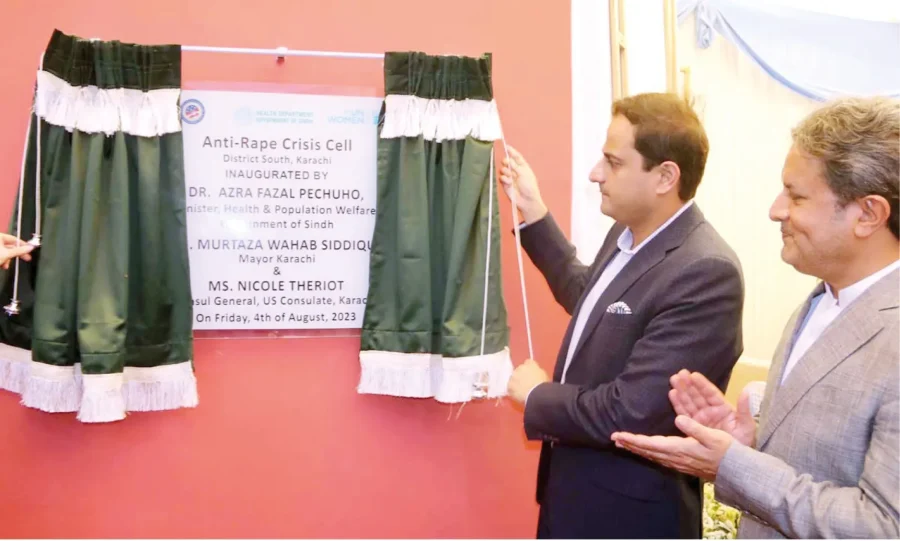Pakistan’s “first-ever” anti-rape crisis cell (ARCC) was set up at Dr Ruth Pfau Civil Hospital Karachi on Friday to deal with a host of issues connected with sexual violence cases, their investigation and rehabilitation of rape survivors.
The cell was set up in the office of Karachi Police Surgeon Dr Sumaiyya Syed by the Sindh Health Department with the technical support of UN Women as a part of the Tahaffuz project funded by the US’s Bureau of International Narcotics and Law Enforcement.
The ARCC aims to provide legal aid, medical and psychological support, and round-the-clock counselling to rape survivors with proper security.
Mayor Murtaza Wahab, US Consul General (CG) Nicole Theriot and Parliamentary Secretary for Health Qasim Soomro inaugurated the anti-rape crisis cell on Friday.
They hailed the much-needed facility as a “crucial step forward” in the pursuit of justice and support for survivors of sexual assault.
Dr Syed said the ARCC was a “victim-centric approach” to ensure the fulfilment of all ethical, medical, forensic, investigative and prosecutorial guidelines with the provision of quality services under one roof.
She opined that the Anti-Rape Act 2021 — which seeks to establish special courts and use modern devices during the investigation and trial of rape cases — passed in the wake of the infamous Lahore-Sialkot Motorway rape case was a giant leap.
Another milestone, she said, was the recent passage of the Sindh Medico-legal (ML) Legal Act 2023 under which the province’s ML structure would be revamped entirely.Dr Syed said social and psychological rehabilitation of rape survivors was made an integral part of the laws. She pointed out that with the passage of the Amal Act in Sindh, the treatment took precedence over ML formalities as doctors were duty-bound to provide treatment first to the patient/injured.
Later in a brief talk with the media, the police surgeon said that around three to four rape cases were being daily reported at three government hospitals in the city.
Meanwhile, Wahab said that as per the law, special courts were bound to complete the trial of rape cases within four months with only one adjournment.
He said if the courts did not accept “pressure” from lawyers for “undue adjournment perpetually”, the conviction rate in rape cases would increase, which would work as a deterrent against the crime.
Wahab proposed setting up similar cells at 11 hospitals across the city run by the Karachi Metropolitan Corporation through joint ventures.
Addressing the ceremony, CG Theriot said that like the US, Pakistan had also made measures against gender-based violence part of its national security.
She pointed out that for the last four decades, the US had invested Rs1 billion for training law enforcers in Pakistan and hoped that with the induction of more female police officers recently in the country, there would be greater sensitivity to gender issues.
Separately, Senior Gender Adviser of UN Women in Pakistan Younas Khalid lamented that the implementation of the law was a basic problem in the country.
He said that with the passage of the ARA-2021, rules were prepared and now the first ARCC was established, which was a “first step towards success”.









